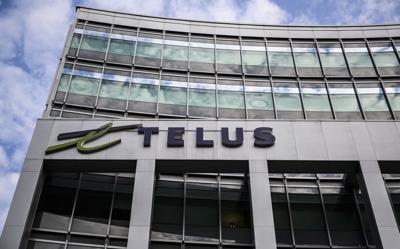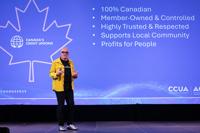TORONTO - A ¥∫…´÷±≤• telecom giant is asking the national regulator to call one of its competitors offside, saying it has been unfairly blocked from advertising on the other company's media platforms.
It's a battle between Telus Corp. and Rogers Communications Inc. that also extends to the ice, with the former alleging that Rogers has used its position as Canada's dominant TV rightsholder for NHL games to interfere with Telus' long-standing sponsorship of the Calgary Flames.¬Ý
The issue was outlined in a complaint filed by Telus in June and posted to the CRTC's website Tuesday. It alleges Rogers has been engaging in "anticompetitive behaviour" that violates regulatory rules.
Rogers disputes that characterization, however, saying Telus' advertisements aim to harm its reputation and therefore don't comply with its content standards.
In November of last year, Rogers refused to air Telus' Black Friday and Cyber Monday ad campaigns on its radio stations "on extremely short notice," according to Telus' filing. It said Rogers did not provide any reason for the refusal.
"However, as a result, Rogers enjoyed exclusive-to-Rogers advertising leading up to Black Friday on all its radio stations," the filing stated. "Rogers therefore had an undue preference in reaching consumers during the most important sales period of the year."
It called the move "particularly brazen," forcing Telus to pivot to alternative platforms where premium ad slots had already been mostly booked up.
Telus said Rogers adopted "a blanket refusal" to accept any Telus, Koodo or Public Mobile ads on its platforms by January, and that it believes other telecom rivals are affected too. It accused Rogers of attempting "to weaken Telus as a competitor."
"Rogers’ conduct began as last-minute cancellations of Telus’ radio advertising campaigns and has progressed to a prohibition, across all of Rogers’ media platforms, on advertisements by other telecommunications providers," the filing stated.
In a statement, Rogers said Telus has "displayed a pattern of creating advertising that is inaccurate, misleading and clearly intended to negatively impact the Rogers brand, products and reputation, despite repeated requests to address these concerns."
"This is contrary to Rogers Sports & Media’s advertising policies and content standards, which include the discretion to reject ads that are intended to defame the company or negatively impact the company’s brand," said spokeswoman Charmaine Khan in a statement.
Meanwhile, Telus said it was also hit with an unexpected cancellation of an ad campaign last November by Calgary Sports and Entertainment Corp., which owns the Calgary Flames. That came after Telus had begun displaying digital board ads for its PureFibre internet service — encouraging customers to "ditch old cable" — at the Scotiabank Saddledome, where the Flames play home games.
Telus said the ads were placed as part of its nearly two-decade sponsorship of the Flames, through which it has advertising rights on some CSEC properties.
But around one month into the campaign, Telus said CSEC informed it that the NHL rejected the ad.
"It is clear that Rogers was behind the NHL’s actions," said Telus' filing, pointing to Rogers' $11-billion agreement with the NHL, starting in the 2026-27 season, that keeps it the national TV rightsholder in Canada for 12 years.
"Rogers and the NHL have a long-standing relationship ... through which Rogers can exert influence."
Telus said the NHL cited concerns about “ambush marketing” — when a brand capitalizes on an event by creating an association without being an official sponsor.
It said that shortly after the NHL blocked the PureFibre ads, Rogers also pulled a Telus commercial for PureFibre from its Calgary Flames broadcasts "on the grounds that it had the authority to remove content deemed damaging to its company."
The Flames declined to comment.
Telus' complaint said Rogers is likely trying to thwart newly increased competition between the two companies, which until recent years had limited overlap of services within their own core regions.
However, Rogers' 2023 purchase of Shaw has given it more incentive to compete for customers in Western Canada, while Telus recently began offering internet service to Ontario and Quebec customers under the CRTC's contentious wholesale rules.
"We believe that Rogers is using their unique and valuable advertising inventory, including certain premier placements, as part of a larger effort to impede Telus’ entry into eastern markets," said Telus spokesman Richard Gilhooley in a statement.
"¥∫…´÷±≤• consumers deserve to know what products and services are available to them, and Telus looks forward to action from the CRTC."
Telus requested the CRTC declare that Rogers, by blocking its ad space, has breached regulations and given itself an "undue" advantage. It said the regulator should order Rogers to immediately grant Telus "commercially reasonable access" to its advertising inventory.
It also asked the commission to order Rogers to "refrain from interfering with Telus’ sponsorship agreements with third parties."
The CRTC said Wednesday it is still reviewing the matter, despite Telus requesting an expedited ruling by the end of July, in time for its back-to-school promotions.
Spokeswoman Mirabella Salem said the commission is accepting comments until Oct. 9 and a decision will follow "in due course." She declined to provide further details while the file is still open.
"The timeline for these proceedings can vary greatly since allegations of undue preference are among the most complex types of applications," said Salem.
"Some can be resolved quickly, while others present issues that require additional information from the parties and careful assessment of the evidence before a decision can be issued."
Rogers said it plans to respond to Telus' application through the CRTC process.
This report by ¥∫…´÷±≤•was first published Sept. 10, 2025.
Companies in this story: (TSX:T, TSX:RCI.B)














































